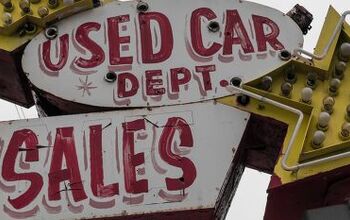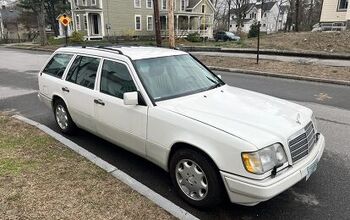Report: Vehicle Supplies Are Climbing Back Up

Vehicle inventories are now approaching the highest levels seen since the summer of 2020. This is according to a report from Cox Automotive, which stated that the month of February opened with the industry seeing an average new vehicle supply of 80 days. However, the figure still doesn’t match the supply averages seen at the start of 2020.
The United States reportedly hit the 80-day mark (representing a 38 percent increase from the same time a year ago) at the very end of January. Vehicle pricing also dropped slightly, though presumably not enough to send anyone running out the door to buy a new automobile due to how outrageously high they’ve been over the last several years. But that might change in a few months if the current trend continues.
From Cox Automotive:
The average new-vehicle listing price opened February at $47,142, down 1 [percent] from a year ago. The average listing price rose throughout December 2023 and started January high, but prices began declining in the second week of January and have been dropping by almost 1 [percent] a week.
The U.S. new-vehicle average transaction price in January was $47,401, down nearly 4 [percent] from a year ago and down almost 3 [percent] from December 2023, according to Kelley Blue Book. (The month of December, when luxury vehicle sales typically surge, often sees a jump in average transaction prices.) Discounts and incentives in January averaged 5.7 [percent] of ATP, up from 5.5 [percent] in December and nearly 100 [percent] higher than a year ago.
Unfortunately, most Americans likely don’t have the money to buy a new vehicle right now and anything they would buy might still be difficult to find. Having asked several car salesmen and visited numerous dealers myself this month, the big takeaway is that markdowns seem to be reserved on the big ticket items that aren’t selling like they used to. Many marquees seem to have a surplus of larger vehicles (mainly SUVs and full-size pickups) that have been loaded up with features and carry sizable sums on the window sticker. All-electric models also appear to be overcapacity on many lots.
But there does not appear to be a similar surplus of affordable models. This is likely the result of many brands deciding to discontinue smaller models in the previous decade. Due to the fact that larger vehicles tend to carry higher margins and superior profitability many automakers simply cut them from their lineup. However, the way in which U.S. regulators have tied emissions rules to vehicle footprints has also incentivized companies to build increasingly massive and expensive products over the years.
Data from Cox showcased which brands had the largest vehicle inventories, signaling that these were either nameplates that managed to produce a lot of vehicles and/or had a harder time selling them once they arrived. Perhaps due to an over-reliance on SUVs and large pickups, domestic brands tended to have the fullest dealerships. The same could be said of marquees that are presently undergoing an identity crisis as they attempt to shift their smaller lineups toward all-electric vehicles.
Dodge reportedly had the highest inventories of any make by a substantial margin. It was followed by Chrysler, Lincoln and Ram. Dealerships selling those brands had an average new vehicle supply exceeding 150 days.
Companies seeing the lowest inventories tended to be Japanese brands offering what customers have grown to expect and a handful of premium brands. Toyota had the lowest by far with a supply of just 38 days. It was followed by Honda, Lexus, Mazda, Land Rover, Cadillac, Kia, Porsche, Subaru and BMW. Those were also the only brands that managed to stay under the 80-day mark.
[Image: Gretchen Gunda Enger/Shutterstock]
Become a TTAC insider. Get the latest news, features, TTAC takes, and everything else that gets to the truth about cars first by subscribing to our newsletter.

A staunch consumer advocate tracking industry trends and regulation. Before joining TTAC, Matt spent a decade working for marketing and research firms based in NYC. Clients included several of the world’s largest automakers, global tire brands, and aftermarket part suppliers. Dissatisfied with the corporate world and resentful of having to wear suits everyday, he pivoted to writing about cars. Since then, that man has become an ardent supporter of the right-to-repair movement, been interviewed on the auto industry by national radio broadcasts, driven more rental cars than anyone ever should, participated in amateur rallying events, and received the requisite minimum training as sanctioned by the SCCA. Handy with a wrench, Matt grew up surrounded by Detroit auto workers and managed to get a pizza delivery job before he was legally eligible. He later found himself driving box trucks through Manhattan, guaranteeing future sympathy for actual truckers. He continues to conduct research pertaining to the automotive sector as an independent contractor and has since moved back to his native Michigan, closer to where the cars are born. A contrarian, Matt claims to prefer understeer — stating that front and all-wheel drive vehicles cater best to his driving style.
More by Matt Posky
Latest Car Reviews
Read moreLatest Product Reviews
Read moreRecent Comments
- Varezhka I have still yet to see a Malibu on the road that didn't have a rental sticker. So yeah, GM probably lost money on every one they sold but kept it to boost their CAFE numbers.I'm personally happy that I no longer have to dread being "upgraded" to a Maxima or a Malibu anymore. And thankfully Altima is also on its way out.
- Tassos Under incompetent, affirmative action hire Mary Barra, GM has been shooting itself in the foot on a daily basis.Whether the Malibu cancellation has been one of these shootings is NOT obvious at all.GM should be run as a PROFITABLE BUSINESS and NOT as an outfit that satisfies everybody and his mother in law's pet preferences.IF the Malibu was UNPROFITABLE, it SHOULD be canceled.More generally, if its SEGMENT is Unprofitable, and HALF the makers cancel their midsize sedans, not only will it lead to the SURVIVAL OF THE FITTEST ones, but the survivors will obviously be more profitable if the LOSERS were kept being produced and the SMALL PIE of midsize sedans would yield slim pickings for every participant.SO NO, I APPROVE of the demise of the unprofitable Malibu, and hope Nissan does the same to the Altima, Hyundai with the SOnata, Mazda with the Mazda 6, and as many others as it takes to make the REMAINING players, like the Excellent, sporty Accord and the Bulletproof Reliable, cheap to maintain CAMRY, more profitable and affordable.
- GregLocock Car companies can only really sell cars that people who are new car buyers will pay a profitable price for. As it turns out fewer and fewer new car buyers want sedans. Large sedans can be nice to drive, certainly, but the number of new car buyers (the only ones that matter in this discussion) are prepared to sacrifice steering and handling for more obvious things like passenger and cargo space, or even some attempt at off roading. We know US new car buyers don't really care about handling because they fell for FWD in large cars.
- Slavuta Why is everybody sweating? Like sedans? - go buy one. Better - 2. Let CRV/RAV rust on the dealer lot. I have 3 sedans on the driveway. My neighbor - 2. Neighbors on each of our other side - 8 SUVs.
- Theflyersfan With sedans, especially, I wonder how many of those sales are to rental fleets. With the exception of the Civic and Accord, there are still rows of sedans mixed in with the RAV4s at every airport rental lot. I doubt the breakdown in sales is publicly published, so who knows... GM isn't out of the sedan business - Cadillac exists and I can't believe I'm typing this but they are actually decent - and I think they are making a huge mistake, especially if there's an extended oil price hike (cough...Iran...cough) and people want smaller and hybrids. But if one is only tied to the quarterly shareholder reports and not trends and the big picture, bad decisions like this get made.


































Comments
Join the conversation
And now for something completely different
Well the manufacturers are catching up with stocks. This means shortages of parts is reducing. Stocks are building around the world even Australia and last year had the most vehicles ever sold here.